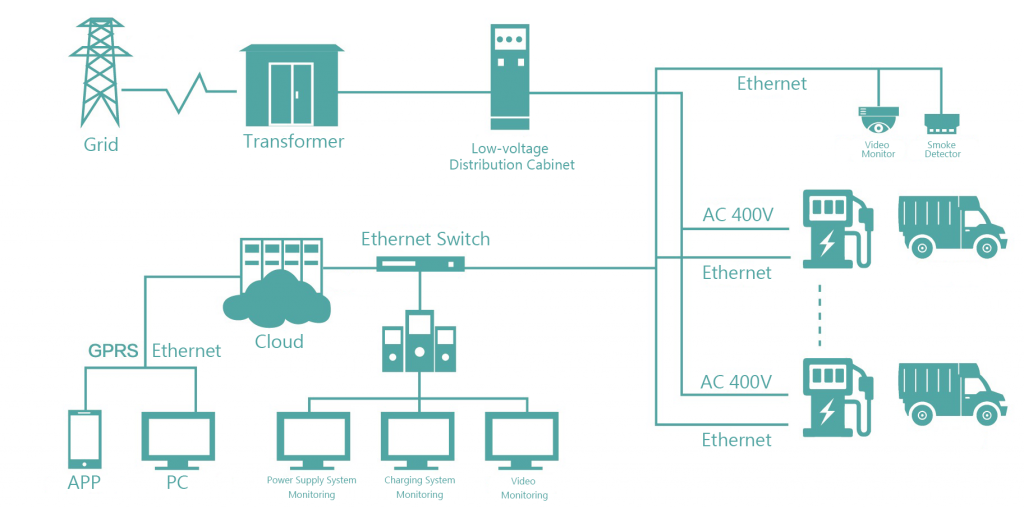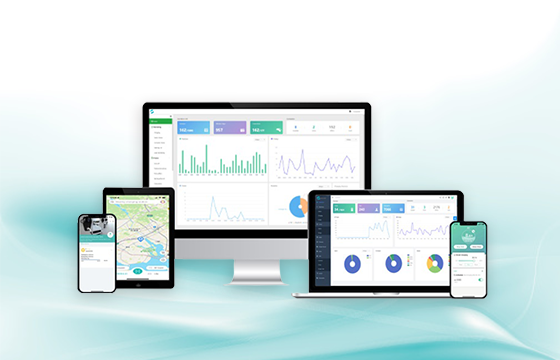Time:
Electric vehicle sales were up 63% globally in 2022 compared to 2021. As EVs are becoming increasingly popular, commercial EV charging stations are essential infrastructure for businesses and public spaces, as well as attractive investment opportunities.
As a homeowner or business owner, it's important to learn about the commercial EV charging stations cost. Here we’ll break down the cost from hardware to software and more, which will grant you the ability to make smart and knowledgeable decisions when analyzing budgets for commercial EV charging stations.
There are several factors that affect commercial EV charging station costs: electrical infrastructure, equipment, soft costs, subsidies, and software.

A charging station supplies electricity to vehicles through its connection to the utility company. So the cost of installing a charging station can vary depending on the existing electrical infrastructure in the area. A new electrical panel, conduit, and wiring may be required to support the charging station. Besides, boring, trenching, and cement work for power lines should also be considered.
The cost of installing electric car charging stations primarily depends on the infrastructure involved. Connecting to an existing 240-volt circuit would typically require only a few hours of an electrician's labor, resulting in a relatively low cost. However, if a dedicated 480-volt circuit needs to be installed, the cost could even reach tens of thousands of dollars.
The cost of commercial EV charging stations varies depending on several factors, such as the brand, the charging speed, the functions, and the installation requirements. Generally, the cost of a Level 2 commercial charging station ranges from $400 to $8,000, while a Level 3 DC fast charging station can cost anywhere from $10,000 to $40,000.
Level 2 EV Charging Stations
Level 2 EV charging stations are the most common type of commercial charging station. They can run on 240-volt power with an average charging time of 2~4 hours. They are ideal for workplaces, retail locations, and public spaces. Level 2 charging stations typically come in two formats: wall-mounted or pedestal-mounted.

Commercial DC Charging
Level 3 DC Fast Charging Stations
The highest specification for a commercial EV charging station is level three, or direct current fast charge (DCFC). Level three stations can charge a vehicle in an hour with a 480-volt direct current. They are ideal for highway rest stops, gas stations, and other high-traffic areas.
Since Level 3 charging stations require more complex technology and higher power levels. Installation costs are also higher.
When setting up a commercial EV charging station, it's important to factor in the cost of obtaining necessary permits and certifications. Additionally, other expenses such as charging parking ports, protective bollards, charger logos, and signalization should also be included in the cost calculations.
For managing or operating purposes, the commercial EV charging station shall install software to streamline operations, reduce costs, and enhance customer experience.
As to electric utilities and municipalities, the software provides valuable insights into EV charging patterns and helps to plan for future infrastructure investments.
For EV drivers, the software allows for easy access to charging stations and payment methods.
The cost of commercial EV charging station software varies depending on the brand and the specific functions and features.

Rebates and incentives - Many states and local governments offer rebates and incentives to encourage the installation of commercial EV charging stations. These can offset some of the installation costs and make the investment more affordable.
Selecting strategic locations for charging stations can help to reduce the costs associated with installation and infrastructure. Choosing locations that already have an electrical infrastructure in place, such as parking lots, can help to minimize the costs of running new electrical lines.
Partnering with local businesses or corporations can help to share the costs of installation and operation. For example, a business may provide space for a charging station in exchange for branding or advertising opportunities.
How much do commercial EV charging stations cost? This is not a simple calculation of the hardware. Apart from the above factors, you should also take into consideration of installation costs, and ongoing maintenance and management costs.
With a focus on providing end-to-end solutions, Grasen Power can help steward your company from the planning stage all the way through to managing a smart EV charging station, which can help to save costs in the long run. By leveraging their expertise in software and hardware, Grasen Power can help ensure that your EV charging station meets your specific needs and goals.
Submit Request